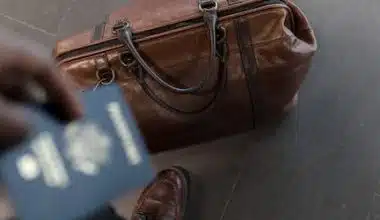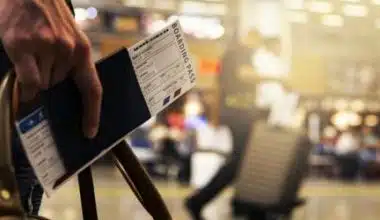Navigating the skies with ease is a priority, and questions about flying with an expired license can add a layer of uncertainty. Unravel the details and considerations of taking a flight with an expired license. The Transportation Security Administration (TSA) accepts expired driver’s licenses or state-issued IDs for up to one year after expiration, but the grace period may vary depending on the state and airline. Non-driver identification is recommended, and REAL ID compliance is required. This article will provide you with the required information to answer the question if you can fly with an expired license.
Can You Fly With An Expired License?
Yes, you can fly with an expired driver’s license under certain conditions. The Transportation Security Administration (TSA) accepts expired driver’s licenses or state-issued IDs for up to one year after the expiration date. However, this policy may vary depending on the state and the airline.
Things To Know About Flying With An Expired License
#1. TSA Acceptance
TSA will accept an expired driver’s license or state-issued ID for up to one year past the expiration date.
#2. Time Limit
The one-year grace period applies to domestic flights within the United States. For international travel, a valid passport is required.
#3. Non-Driver Identification
If you don’t have a valid driver’s license but possess another form of government-issued identification, such as a passport or state-issued ID card, it’s generally recommended to use those documents instead of an expired license.
#4. REAL ID Compliance
Beginning May 7, 2025, if you plan to use your state-issued ID or license to fly within the U.S., make sure it is REAL ID-compliant. If you are unsure whether your ID complies with a real ID, check with your state’s DMV.
#5. Alternate Forms of Identification
In special circumstances, TSA has identified acceptable alternate forms of identification for use at the checkpoint. These include the Transportation Worker Identification Credential, the U.S. Citizenship and Immigration Services Employment Authorization Card, the U.S. Merchant Mariner Credential, and the Veteran Health Identification Card, among others.
#6. International Travel
While the TSA may accept an expired license for domestic travel within the United States, it’s important to note that international travel typically requires a valid passport. Even if you are flying within the United States but have a connecting flight in another country, it’s advisable to have a valid passport to avoid any complications.
#7. Secondary Screening
If you present an expired license at the security checkpoint, you may be subject to additional screening procedures. This might include additional questioning or a more thorough physical inspection by TSA officers.
#8. State-Specific Regulations
Each state has the authority to set its own rules regarding the acceptance of expired licenses for air travel. It’s crucial to check with your state’s DMV or licensing agency to understand the specific guidelines and limitations that apply to your situation.
#9. Identification Verification
While an expired license may still be accepted, TSA officers will still verify your identity. They may ask you additional questions or request other forms of identification to ensure you are the rightful owner of the expired license.
#10. Age Restrictions
Some airlines may have age restrictions when it comes to flying with an expired license. For example, minors may be required to present a valid identification document, such as a passport, even if their parent or guardian has an expired license.
Risks and Limitations of Flying With An Expired License
Flying with an expired license can come with certain risks and limitations. These are the risks of flying with an expired license
#1. TSA Discretion
While the TSA may accept an expired license for up to one year after the expiration date, their acceptance is subject to their discretion. The final decision rests with the TSA officer at the security checkpoint, and they may require additional identification or subject you to further screening procedures.
#2. State-Specific Regulations
Each state has the authority to set its own rules regarding the acceptance of expired licenses for air travel. It’s important to check with your state’s DMV or licensing agency to understand the specific limitations and guidelines that apply to your situation.
#3. Potential Delays or Denial of Boarding
Presenting an expired license may lead to delays or even denial of boarding. Airlines have their own policies and may require valid identification for security and verification purposes. It’s advisable to check with your airline before your flight to ensure you have the necessary identification to travel.
#4. International Travel Restrictions
While an expired license may be accepted for domestic flights within the United States, international travel typically requires a valid passport. It’s important to ensure that your travel documents are up-to-date and comply with the requirements of the destination country.
#5. Limited Identification Verification
An expired license may limit your ability to prove your identity in certain situations. While it may still be accepted for air travel, other situations, such as renting a car or entering certain establishments, may require a valid and current form of identification.
#6. Potential Inconvenience
Flying with an expired license may result in additional scrutiny, questioning, or secondary screening at the security checkpoint. This can potentially cause inconvenience and delays during the travel process.
#7. Denied Boarding
While TSA may accept an expired license, there is a chance that the TSA officer or airline personnel may deny you boarding if they determine that your identification is not sufficient for security or verification purposes.
#8. Inconsistent Enforcement
The enforcement of the policy regarding expired licenses can vary. While the TSA generally allows expired licenses within one year of expiration, some TSA officers or airlines may have different interpretations or stricter policies, leading to potential conflicts or difficulties during the boarding process.
#9. Legal Consequences
While the risks associated with flying with an expired license are primarily related to travel and identification issues, it’s important to note that operating a vehicle with an expired license outside of air travel can have legal consequences. It’s essential to renew your license promptly to comply with local laws and regulations.
Alternative Documents That Can Be Used As Identification For Flying.
When flying, there are alternative forms of identification that can be used if you have an expired license.
Here are some alternatives:
#1. Passport
A valid passport is widely accepted as a form of identification for domestic and international flights. It is an official government-issued document that verifies your identity and citizenship.
#2. Passport Card
The passport card is a wallet-sized alternative to a traditional passport. It can be used for land and sea travel between the United States, Canada, Mexico, the Caribbean, and Bermuda. However, it cannot be used for international air travel.
#3. Trusted Traveler Programs
If you are a member of a trusted traveler program such as TSA PreCheck, Global Entry, Nexus, or SENTRI, you can use your membership card as an alternative form of identification. These programs require a thorough background check and provide expedited security screening for approved travelers.
#4. U.S. Military ID
Active-duty military personnel and their dependents can use a valid U.S. military ID as an alternative form of identification for air travel.
#5. Permanent Resident Card
If you are a lawful permanent resident of the United States, commonly known as a green card holder, you can use your Permanent Resident Card (Form I-551) as a valid form of identification for air travel.
#6. Enhanced Driver’s License (EDL)
Some states offer enhanced driver’s licenses that are compliant with the REAL ID Act and can be used for domestic air travel. These licenses have additional security features and are accepted as an alternative to a standard driver’s license.
#7. Transportation Worker Identification Credential (TWIC)
If you work in the transportation industry, you may possess a TWIC card. This card can be used as an alternative form of identification for air travel.
#8. State Identification Card
If you don’t have a valid driver’s license but have a state-issued identification card, such as a non-driver ID, you can use it as an alternative form of identification for air travel. The Department of Motor Vehicles (DMV) issues state identification cards, which serve as official identification documents.
#9. Consular ID Card
If you are a foreign national residing in the United States, your country’s embassy or consulate may have issued you a consular identification card. While acceptance can vary, some airlines and TSA officers may consider consular ID cards as a valid form of identification for domestic flights.
#10. Birth Certificate
In certain cases, a government-issued birth certificate with a raised seal can be used as an alternative form of identification. It’s crucial to keep in mind that a birth certificate may not be sufficient on its own for air travel and may require additional identification documents.
Steps To Take When Your License Expires Before Flying
#1. Check TSA Guidelines
Review the Transportation Security Administration’s (TSA) guidelines to understand their policies regarding expired identification. If your driver’s license or state-issued ID expires on or after March 1, 2022, it can still be accepted for air travel for a certain period.
#2. Know Your State’s Policies
Familiarize yourself with your state’s specific policies regarding expired licenses and their acceptance for air travel. Some states may have extended expiration dates or provide alternative options for identification.
#3. Bring Additional Identification
Even if your license is expired, it’s advisable to bring additional forms of identification. Acceptable alternatives may include a valid passport, passport card, state identification card, or other government-issued identification documents.
#4. Allow Extra Time
Arrive at the airport earlier than usual to allow for potential delays or additional screening procedures. Presenting an expired license may require further verification or secondary screening, which can take additional time.
#5. Contact the Airline
Reach out to your airline in advance to inquire about their specific policies and any additional requirements for passengers with expired licenses. They can provide guidance and clarify any concerns you may have.
#6. Consider Renewal Options
If time permits, explore the possibility of renewing your license before your flight. Check with your state’s Department of Motor Vehicles (DMV) to understand the renewal process and any expedited options that may be available.
How To Renew Your License Before Flying
Passengers can renew their licenses before traveling by following these general steps:
#1. Check the Renewal Period
Learn about the renewal period that your state’s Department of Motor Vehicles (DMV) allows. Some states allow renewal up to six months before the expiration date, while others may have different timelines.
#2. Gather Required Documents
Prepare the necessary documents for license renewal. This includes proof of identity, proof of residency, and payment for the renewal fee. Check your state’s DMV website for the specific documents required.
#3. Schedule an Appointment
Depending on your state’s requirements, you may need to schedule an appointment with the DMV to renew your license. Some states also offer online renewal options for eligible individuals.
#4. Complete the Renewal Process
Visit the DMV office or follow the online renewal process to complete the necessary steps. This may involve submitting the required documents, taking a new photo, and paying the renewal fee.
#5. Obtain Temporary Documents (if applicable)
In some cases, the DMV may provide a temporary license or an extension document that can be used until the new license arrives by mail. Check with your state’s DMV for any temporary documents you may need to carry while waiting for the renewed license.
Can I Fly With An Expired Passport?
When flying, it is generally not acceptable to fly with an expired passport for international travel. However, for domestic travel within the United States, an expired passport is not required. The Transportation Security Administration (TSA) accepts other forms of identification, such as a valid driver’s license, state identification card, or other government-issued identification. It’s important to note that specific requirements and acceptability can vary depending on factors such as the destination, specific circumstances, and the discretion of immigration authorities.
What ID Can You Use To Fly?
Acceptable forms of identification for flying include a valid driver’s license or state photo ID, a passport, REAL ID-compliant driver’s licenses or identification cards, a Transportation Worker Identification Credential (TWIC), a U.S. military ID, a U.S. Citizenship and Immigration Services Employment Authorization Card (I-766), and other TSA-approved forms of identification. It’s important to note that the specific requirements and acceptability may vary depending on factors such as the destination and the discretion of TSA officers and airline personnel.
What Is Not Allowed On Airplanes?
Items that are generally not allowed on airplanes include firearms and weapons, sharp objects, liquids and gels in containers larger than 3.4 ounces (100 milliliters), explosives and flammable materials, disabling chemicals and devices, and restricted tools. However, specific regulations and restrictions may vary between countries and airlines.
What Do You Need to Fly on a Plane From State to State?
To fly on a plane from state to state, you typically need a valid form of identification. Commonly accepted forms of ID include a REAL ID-compliant driver’s license or ID, a passport, or other government-issued photo ID. Nevertheless, the specific requirements may vary between airlines and states.
What Documents Do I Need at the Airport to Fly?
To fly at the airport, adults aged 18 and older must present valid identification, such as a REAL ID-compliant driver’s license or passport. A boarding pass, obtained online or at the airport, is also required. Additional documents, such as a valid passport for international travel or a visa, may be required, depending on the destination and airline.
What Documents Do I Need to Fly Internationally?
When flying internationally, you typically need a valid passport, possibly a visa depending on your destination, and potentially other documents such as proof of accommodation and sufficient funds. It’s important to check the specific requirements of your destination country and ensure you have the necessary documents before your trip.
Conclusion
It’s crucial to check with your airline and ensure you have the necessary identification for security and verification purposes. Alternative forms of identification for flying include a valid passport, a passport card, and other requirements. Passports verify identity and citizenship, cards offer wallet-sized options, and membership cards require thorough background checks. To renew an expired license before air travel, review TSA guidelines, understand your state’s policies, bring additional identification, allow extra time at the airport, contact your airline, and consider renewing your license before your flight, ensuring you have the necessary documents for your flight.
- HOW LONG IS A US PASSPORT GOOD FOR?
- WHAT DO I NEED TO RENT A CAR? Basic Requirements Explained
- WHEN DOES A PASSPORT EXPIRE? All You Need To Know
- DO YOU NEED A PASSPORT TO GO TO ALASKA?
- HOW LONG DO PASSPORTS LAST?






